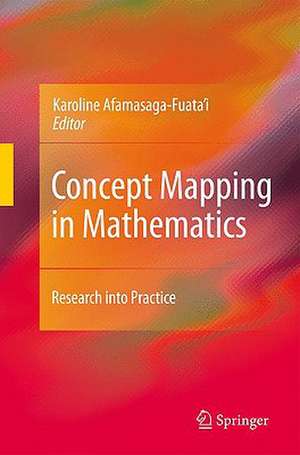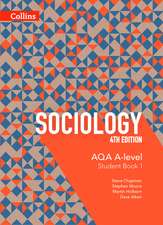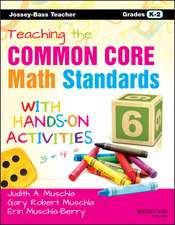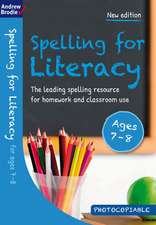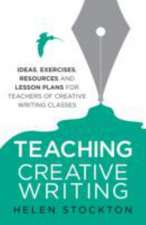Concept Mapping in Mathematics: Research into Practice
Editat de Karoline Afamasaga-Fuata'ien Limba Engleză Hardback – 5 mar 2009
Thematically, the book flows from a historical development overview of concept mapping in the sciences to applications of concept mapping in mathematics by teachers and pre-service teachers as a means of analyzing mathematics topics, planning for instruction and designing assessment tasks including applications by school and university students as learning and review tools. This book provides case studies and resources that have been field tested with school and university students alike. The findings presented have implications for enriching mathematics learning and making problem solving more accessible and meaningful for students.
The theoretical underpinnings of concept mapping and of the studies in the book include Ausubel’s cognitive theory of meaningful learning, constructivist and Vygotskian psychology to name a few. There is evidence particularly from international studies such as PISA and TIMSS and mathematics education research, which suggest that students’ mathematical literacy and problem solving skills can be enhanced through students collaborating and interacting asthey work, discuss and communicate mathematically. This book proposes the meta-cognitive strategy of concept mapping as one viable means of promoting, communicating and explicating students’ mathematical thinking and reasoning publicly in a social setting (e.g., mathematics classrooms) as they engage in mathematical dialogues and discussions.
Concept Mapping in Mathematics: Research into Practice is of interest to researchers, graduate students, teacher educators and professionals in mathematics education.
| Toate formatele și edițiile | Preț | Express |
|---|---|---|
| Paperback (1) | 643.34 lei 6-8 săpt. | |
| Springer Us – 8 dec 2010 | 643.34 lei 6-8 săpt. | |
| Hardback (1) | 647.40 lei 6-8 săpt. | |
| Springer Us – 5 mar 2009 | 647.40 lei 6-8 săpt. |
Preț: 647.40 lei
Preț vechi: 761.65 lei
-15% Nou
Puncte Express: 971
Preț estimativ în valută:
123.88€ • 132.47$ • 103.29£
123.88€ • 132.47$ • 103.29£
Carte tipărită la comandă
Livrare economică 18 aprilie-02 mai
Preluare comenzi: 021 569.72.76
Specificații
ISBN-13: 9780387891934
ISBN-10: 0387891935
Pagini: 339
Ilustrații: V, 220 p. 200 illus.
Dimensiuni: 155 x 235 x 23 mm
Greutate: 0.61 kg
Ediția:2009
Editura: Springer Us
Colecția Springer
Locul publicării:New York, NY, United States
ISBN-10: 0387891935
Pagini: 339
Ilustrații: V, 220 p. 200 illus.
Dimensiuni: 155 x 235 x 23 mm
Greutate: 0.61 kg
Ediția:2009
Editura: Springer Us
Colecția Springer
Locul publicării:New York, NY, United States
Public țintă
ResearchCuprins
A: A Historical Overview Of Concept Mapping.- The Development and Evolution of the Concept Mapping Tool Leading to a New Model for Mathematics Education.- B: Primary Mathematics Teaching And Learning.- Analysing the “Measurement” Strand Using Concept Maps and Vee Diagrams.- Concept Mapping as a Means to Develop and Assess Conceptual Understanding in Primary Mathematics Teacher Education.- Using Concept Maps and Vee Diagrams to Analyse the “Fractions” Strand in Primary Mathematics.- Concept Maps as Innovative Learning and Assessment Tools in Primary Schools.- C: Secondary Mathematics Teaching And Learning.- Evidence of Meaningful Learning in the Topic of ‘Proportionality’ in Second Grade Secondary Education.- Concept Mapping as a Means to Develop and Assess Conceptual Understanding in Secondary Mathematics Teacher Education.- Concept Mapping a Teaching Sequence and Lesson Plan for “Derivatives”.- Curricular Implications of Concept Mapping in Secondary Mathematics Education.- Using Concept Maps and Gowin’s Vee to Understand Mathematical Models of Physical Phenomena.- Applying Concept Mapping to Algebra I.- D: University Mathematics Teaching And Learning.- Enhancing Undergraduate Mathematics Learning Using Concept Maps and Vee Diagrams.- Concept Mapping: An Important Guide for the Mathematics Teaching Process.- Concept Mapping and Vee Diagramming “Differential Equations”.- Using Concept Maps to Mediate Meaning in Undergraduate Mathematics.- E: Future Directions.- Implications and Future Research Directions.
Textul de pe ultima copertă
Concept Mapping in Mathematics: Research into Practice is the first comprehensive book on concept mapping in mathematics. It provides the reader with an understanding of how the meta-cognitive tool, namely, hierarchical concept maps, and the process of concept mapping can be used innovatively and strategically to improve planning, teaching, learning, and assessment at different educational levels. This collection of research articles examines the usefulness of concept maps in the educational setting, with applications and examples ranging from primary grade classrooms through secondary mathematics to pre-service teacher education, undergraduate mathematics and post-graduate mathematics education. A second meta-cognitive tool, called vee diagrams, is also critically examined by two authors, particularly its value in improving mathematical problem solving.
The theoretical underpinnings of concept mapping and of the studies in the book include Ausubel’s cognitive theory of meaningful learning, constructivist and Vygotskian psychology to name a few. There is evidence which suggests that students’ mathematical literacy and problem solving skills can be enhanced through students collaborating and interacting as they work, discuss and communicate mathematically. This book proposes the meta-cognitive strategy of concept mapping as one viable means of promoting, communicating and explicating students’ mathematical thinking and reasoning publicly in a social setting as they engage in mathematical dialogues and discussions.
Concept Mapping in Mathematics: Research into Practice is of interest to researchers, graduate students, teacher educators and professionals in mathematics education.
The theoretical underpinnings of concept mapping and of the studies in the book include Ausubel’s cognitive theory of meaningful learning, constructivist and Vygotskian psychology to name a few. There is evidence which suggests that students’ mathematical literacy and problem solving skills can be enhanced through students collaborating and interacting as they work, discuss and communicate mathematically. This book proposes the meta-cognitive strategy of concept mapping as one viable means of promoting, communicating and explicating students’ mathematical thinking and reasoning publicly in a social setting as they engage in mathematical dialogues and discussions.
Concept Mapping in Mathematics: Research into Practice is of interest to researchers, graduate students, teacher educators and professionals in mathematics education.
Caracteristici
Offers first look at concept mapping in mathematics education Includes foremost authors in the field of concept mapping Provides research based applications for a variety of educational levels, ranging from primary to graduate level Presents a pedagogical application of concept mapping informed by research
